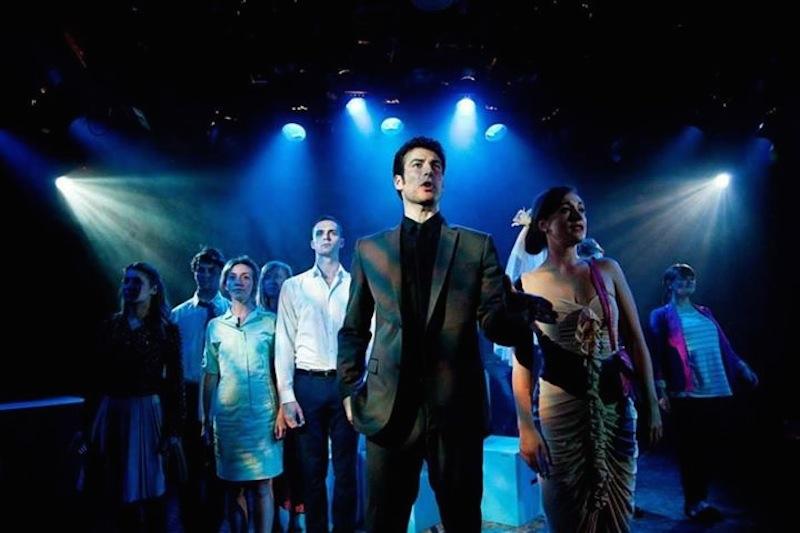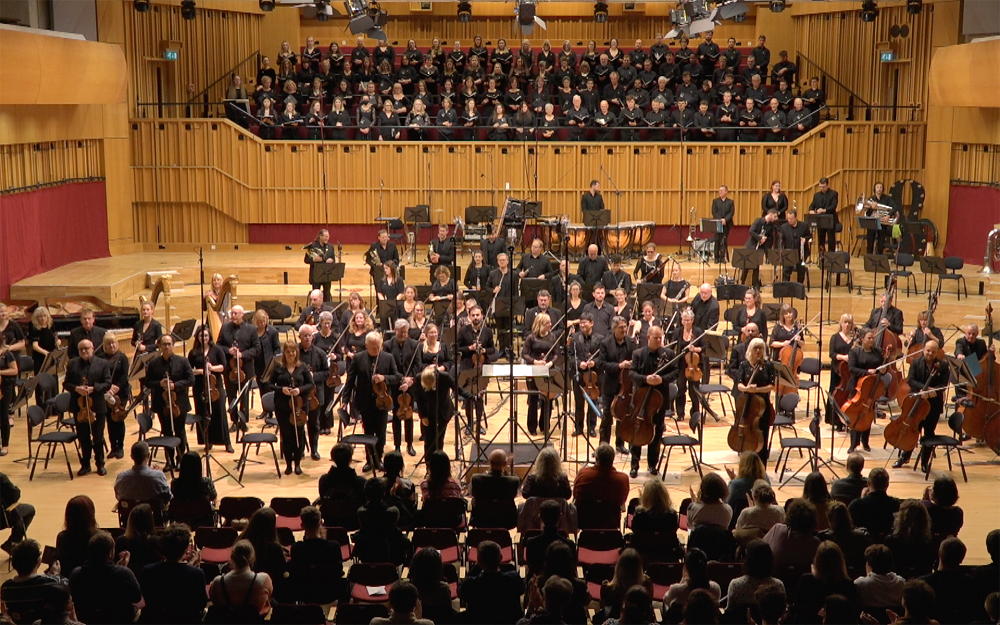BBC National Chorus of Wales, BBC NOW, Jeannin, BBC Hoddinott Hall, Cardiff review - competent music-making, interesting choices | reviews, news & interviews
BBC National Chorus of Wales, BBC NOW, Jeannin, BBC Hoddinott Hall, Cardiff review - competent music-making, interesting choices
BBC National Chorus of Wales, BBC NOW, Jeannin, BBC Hoddinott Hall, Cardiff review - competent music-making, interesting choices
Stravinsky and Ravel interwoven with choral rarities

There are conductors, and then again there are choral conductors. I sang under David Willcocks in Tallis’s 40-part "Spem in alium" and remember vividly that long-armed semaphoring that he later applied so notably with the Bach Choir.
Sofi Jeannin, choral conductor par excellence (of, among others, the BBC Singers), is likewise a semaphorer, not always comfortable to watch, effective if not outstandingly individual in the outcome. In this typically hybrid BBC National Orchestra of Wales concert she conducted three tricky choral works with the dependable BBC National Chorus of Wales, and, sandwiched between them, the no less tricky Symphonies of Wind Instruments of Stravinsky and the perhaps marginally more straightforward Le tombeau de Couperin of Ravel. It was an evening of efficient, competent music-making, somewhat lacking in the heights and depths one hopes for in music of this kind.
The distinction emerged at the very start in Ravel’s L’Aurore, a five-minute choral piece about the dawn composed in 1905 for the Paris Conservatoire’s Prix de Rome. Like most Prix de Rome works (including Berlioz’s and Debussy’s various attempts), it’s profoundly, probably designedly dull music, if showily written, with colourful orchestration and rich textures. But one listens in vain for any anticipation of the famous, supremely un-dull dawn music in Daphnis et Chloë, six or seven years later. Likewise in the incessant fake orientalism of Lili Boulanger’s Vieille prière bouddhique, one searched in vain for traces of the brilliance of her best choral music (Du fond de l’abime, for instance). Even women, it appears, are capable of writing bad music. But Lili needs no apology, except perhaps from God for taking her when she was only 24.  Jeannin could make little of this unpromising material, but managed it attentively and respectfully, qualities she also brought, at the end of the evening, to Stravinsky’s Symphony of Psalms. This was a solid, correct performance, well-paced, slowish speeds that in fact agreed with the revised score, though Stravinsky was wildly inconsistent in these matters and often seems not to have noticed the big tempo changes he made in otherwise unaltered revisions. What Jeannin didn’t always achieve was that particular incisiveness the composer calls for in the articulation of consonants and syllables. For him, words were often not meanings but sonorities. And I missed in Jeannin’s reading this spitting of the syllables, in for instance the soft Laudate dominums of the finale – a technique hard to achieve with chorus singers who tend to think in terms of line rather than the old lips, teeth and tongue.
Jeannin could make little of this unpromising material, but managed it attentively and respectfully, qualities she also brought, at the end of the evening, to Stravinsky’s Symphony of Psalms. This was a solid, correct performance, well-paced, slowish speeds that in fact agreed with the revised score, though Stravinsky was wildly inconsistent in these matters and often seems not to have noticed the big tempo changes he made in otherwise unaltered revisions. What Jeannin didn’t always achieve was that particular incisiveness the composer calls for in the articulation of consonants and syllables. For him, words were often not meanings but sonorities. And I missed in Jeannin’s reading this spitting of the syllables, in for instance the soft Laudate dominums of the finale – a technique hard to achieve with chorus singers who tend to think in terms of line rather than the old lips, teeth and tongue.
Much crisper was Jeannin’s take on Symphonies, also in the comprehensively revised score of 1947. Like Koussevitsky in the notorious London premiere of 1921 (with a Brahms symphony), she left the wind players where they had just been for Ravel, with the heavy brass away to the right, which raised some issues of blend and balance while requiring the conductor to continue semaphoring. Only in Le tombeau de Couperin, with its standard Mozart orchestra plus a single trumpet lurking shyly beside the bassoons, was she relieved of this necessity, and to tell the truth this was the most enjoyable, relaxed performance of the evening, with some lovely woodwind playing especially, but the BBC NOW generally in finely polished form, and Ravel, of course, at his elegant best.
rating
Explore topics
Share this article
Subscribe to theartsdesk.com
Thank you for continuing to read our work on theartsdesk.com. For unlimited access to every article in its entirety, including our archive of more than 15,000 pieces, we're asking for £5 per month or £40 per year. We feel it's a very good deal, and hope you do too.
To take a subscription now simply click here.
And if you're looking for that extra gift for a friend or family member, why not treat them to a theartsdesk.com gift subscription?
more Classical music
 Classical CDs: Cowhorns, gloves and marching drums
Contemporary sounds from Norway, plus rediscovered American and a brass dectet
Classical CDs: Cowhorns, gloves and marching drums
Contemporary sounds from Norway, plus rediscovered American and a brass dectet
 Kolesnikov, Wigmore Hall review - celestial navigation through a cabinet of wonders
Quirky but brilliant programme finds connections between unlikely bedfellows
Kolesnikov, Wigmore Hall review - celestial navigation through a cabinet of wonders
Quirky but brilliant programme finds connections between unlikely bedfellows
 Orchestre Révolutionnaire et Romantique, Sousa, St Martin-in-the-Fields review - Beethoven, younger than springtime
An exuberant cobweb-clearing symphony cycle
Orchestre Révolutionnaire et Romantique, Sousa, St Martin-in-the-Fields review - Beethoven, younger than springtime
An exuberant cobweb-clearing symphony cycle
 Hough, Hallé, Elder, Bridgewater Hall, Manchester review - affection and adventure
Sir Stephen Hough’s piano concerto receives its European premiere
Hough, Hallé, Elder, Bridgewater Hall, Manchester review - affection and adventure
Sir Stephen Hough’s piano concerto receives its European premiere
 Bavouzet, Manchester Camerata, Takács-Nagy, Stoller Hall, Manchester review - fun with abandon
Approaching the final goal of ‘Mozart, made in Manchester’
Bavouzet, Manchester Camerata, Takács-Nagy, Stoller Hall, Manchester review - fun with abandon
Approaching the final goal of ‘Mozart, made in Manchester’
 Dunedin Consort, Mulroy, Wigmore Hall review - songs of love old and new
First-rate chamber choir explore contemporary and Renaissance approaches to amour
Dunedin Consort, Mulroy, Wigmore Hall review - songs of love old and new
First-rate chamber choir explore contemporary and Renaissance approaches to amour
 Coote, LSO, Tilson Thomas, Barbican review - the triumph of life
A great, ailing conductor rises to Mahler's mightiest challenge
Coote, LSO, Tilson Thomas, Barbican review - the triumph of life
A great, ailing conductor rises to Mahler's mightiest challenge
 Britten Sinfonia, The Marian Consort, Milton Court review - a journey around turbulent spirit Gesualdo
Contemporary homages among the works in this celebration of the Renaissance 'badass'
Britten Sinfonia, The Marian Consort, Milton Court review - a journey around turbulent spirit Gesualdo
Contemporary homages among the works in this celebration of the Renaissance 'badass'
 Classical CDs: Coffee, peppercorns and puppets
A prolific conductor's centenary celebrated, plus Hungarian ballet music and baroque keyboard concertos
Classical CDs: Coffee, peppercorns and puppets
A prolific conductor's centenary celebrated, plus Hungarian ballet music and baroque keyboard concertos
 Sansara, Manchester Collective, Bridgewater Hall, Manchester review - sense of a unique experience
Three world premieres all respond to Feldman’s 'Rothko Chapel'
Sansara, Manchester Collective, Bridgewater Hall, Manchester review - sense of a unique experience
Three world premieres all respond to Feldman’s 'Rothko Chapel'
 Gomyo, National Symphony Orchestra, Kuokman, National Concert Hall, Dublin review - painful brilliance around a heart of darkness
A violinist for all facets of a towering Shostakovich masterpiece
Gomyo, National Symphony Orchestra, Kuokman, National Concert Hall, Dublin review - painful brilliance around a heart of darkness
A violinist for all facets of a towering Shostakovich masterpiece
 Remembering conductor Andrew Davis (1944-2024)
Fellow conductors, singers, instrumentalists and administrators recall a true Mensch
Remembering conductor Andrew Davis (1944-2024)
Fellow conductors, singers, instrumentalists and administrators recall a true Mensch

Add comment